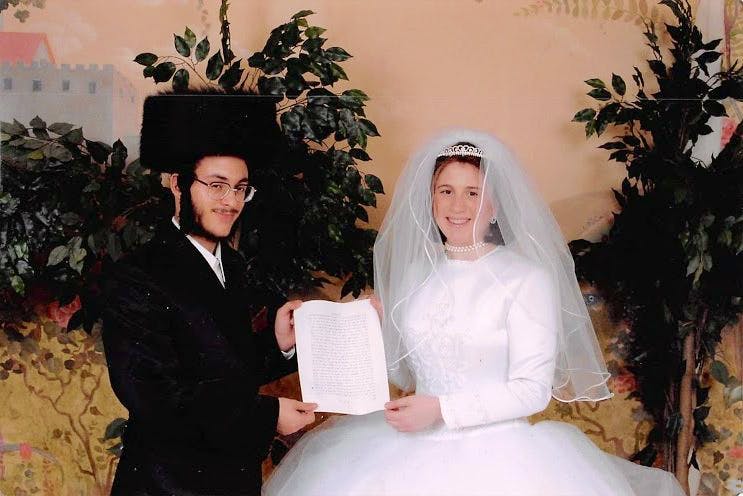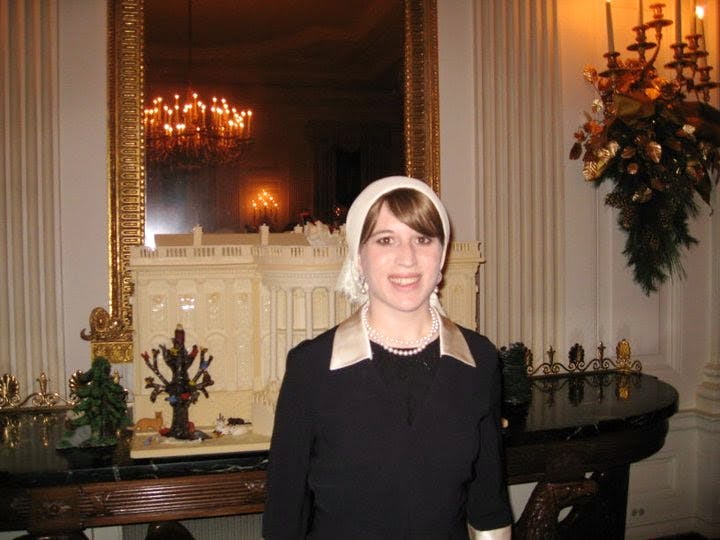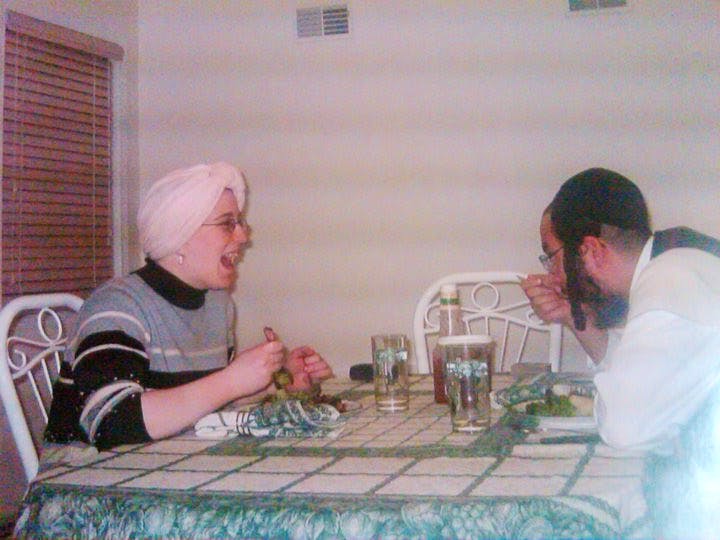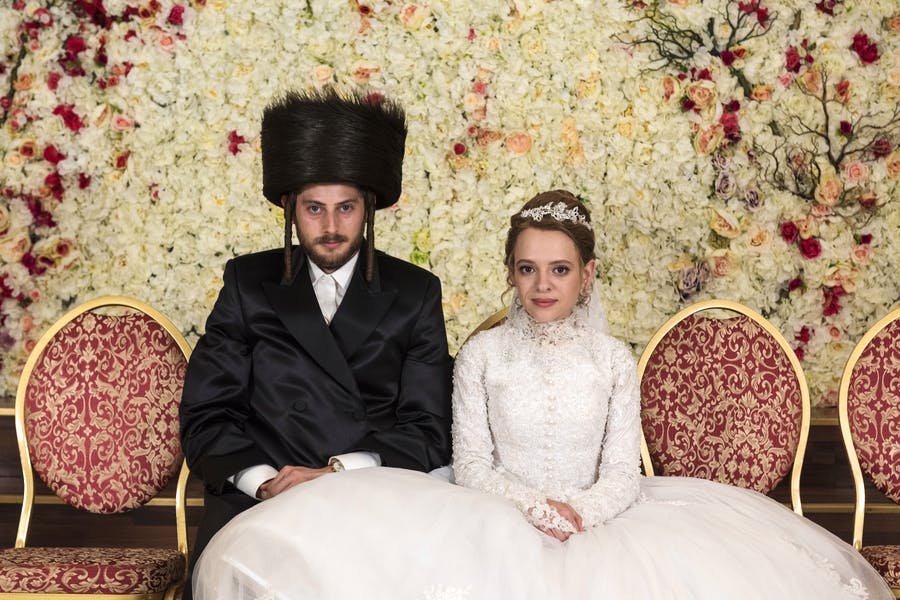A few blocks away are hipster-dense streets with street art and coffee shops. But around Lee Avenue in Williamsburg, it’s as if time has stood still.
Men in white knee socks, high hats and coats from another century rush by. Women wearing wigs or shawls on their heads. Here are kosher grocery stores, synagogues and a mikvah – a ritual Jewish bath. It is an enclave few outsiders get real insight into.
In the middle of the New York City, the Hasidic community – fundamentalist ultra-Orthodox Jews – practice strict gender segregation, distancing themselves from Western modern society without television, cinema and pop music.
This is the environment in which 19-year-old Esty grows up in Netflix’s new series Unorthodox. After getting married, she chooses to flee to liberal Berlin to start a new life. Soon a cat-and-mouse race begins when her husband tries to bring her home again.
The show, based on a memoir by Deborah Feldman, has been hailed for its precise and detailed portrayal of the otherwise closed group Satmar in Williamsburg. But Frieda Vizel, who herself grew up in a Satmar society, is not at all pleased with the tv-series.
“People appreciate the show because they don’t know anything about the Hasidic community. It is sloppy, lazy, and is made from a secular point of view. There are so many errors, both big and small,” she says. “They failed to capture the spirit of the culture. The styling in the apartments is completely off, the clothes are strange. They blend English words into their Yiddish in the wrong places, and the songs don’t fit in with the right holidays – it’s like singing Merry Christmas on the 4th of July.”
What’s your biggest issue with the series? “That people are portrayed as muted and everything is so melodramatic. I’d rather say that Hasidic people have a lively culture, with gossip and close, warm relationships. The characters should have been more multifaceted. Sure there are mean people in the Hasidic community too, but they reinforce stereotypes and have made them into clichéd Disney villains. It’s portrayed as a society of tyranny, like the dystopia in The Handmaid’s Tale. Not everyone is a victim of oppression.”

Frieda Vizel
Were there elements that felt true to your own experiences? ”I liked how the relatives came to the bride one by one during the wedding. There was an intimacy that felt genuine and real, neither evil nor good – but familiar.”
The series has been acclaimed for having consulted with members of the ultra-Orthodox community so that the details would be more authentic. But what does Vizel think was the extent of their involvement? ”I think they have exaggerated their involvement. Most have not been part of the Satmar group or aren’t Hasidic. Several actors are Israelis, and you can hear it on their dialect. The series’ creators did research by participating in one of my guided tours in the Williamsburg Hasidic community – but three hours of a guided tour is not enough.”
What was it like growing up in a Hasidic community? “I had a lot of problems with many things. You have to put yourself in line, otherwise you will be socially punished. Religious life is everything, there is no room for anything else. For me, it was too high of a price to pay. So I left ten years ago, along with my son who was then five years old.”

Frieda Vizel
“As I got older I had a hard time fitting in, and I started asking more questions. Such as why married women have to shave their head – I didn’t understand why. It got me into a lot of trouble. I had so many secrets: I learned how to drive a car, even though women are not allowed to, and I watched films that weren’t allowed, such as The Parent Trap and Home Alone. I think they’re silly movies nowadays, but back then I thought ”wow”!”
”I was happy to have ended up in an arranged marriage where my husband allowed it. For a while I even blogged under a pseudonym about my life as a Hasidic woman. I wanted to leave the group with my husband, but he didn’t want to. Later he ended the marriage. Although I did not escape as Esty does in the series – I do not know anyone who has done it that way. Leaving often happens more gradually.”

Frieda Vizel with her husband.
How did you feel after you left? “It was a a total culture shock. The Hasidic people don’t have any knowledge of popular culture. For example, I did not know that you eat turkey at Christmas in the US, or what the The Simpsons was. Everyone spoke a language I didn’t fully understand, so I felt very different.”
In the series, Yanky, Etsy’s husband, doesn’t know how the internet works on a smartphone. “You are allowed to have phones, but they should be kosher. Everyone has access to the internet through kiosks in the neighbourhood. You can use it to for example shop online, albeit limited to some websites. Today, some even have access to Instagram, but they stay in their bubble and do not follow secular accounts.”
How did you feel shaving your hair the day after your wedding? “For me it was no big deal. I worried more about whether my new husband would talk to me about forbidden music. However, I have heard about friends who locked themselves in the bathroom because they do not want to shave their hair. In the series I think they over-dramatise the event and make it look like abuse. For a majority, it’s just part of the ritual, a rite of passage.”
Esty gets a very basic sex ed class the day before her wedding and is shocked. Is that realistic? “It depends on who you ask. Sure, it’s true that we have such lectures, and for some it will probably come as a surprise. Sex and romance are very cut out of the Hasidic culture, so people can be very naive. I think many people knew to some degree though, because young girls secretly talk to each other and we figured things out about pregnancies.”
Today Frieda Vizel lives in another part of Brooklyn, together with her 14 year old son Seth. But her parents and other relatives still live in Hasidic communities, both in Williamsburg and upstate New York.

Frieda Vizel, Credit: Beka Namicheishvili
It has now been ten years since Vizel left. How has she found life after leaving? ”More difficult than I expected. Especially getting it together financially and I did not expect that I would feel so isolated. At the same time, I really like living here in town, it’s like a utopia in many ways. I thought I’d always feel like an outsider – I don’t anymore.”
”My family always welcomed me to visit, although as with everything in the community, relationships were at times strained. I feel like things have been improving over the years and visiting has become less stressful and more of a positive experience for me.”






Comments